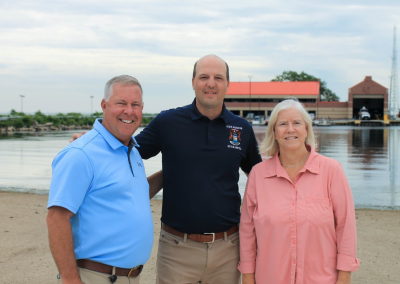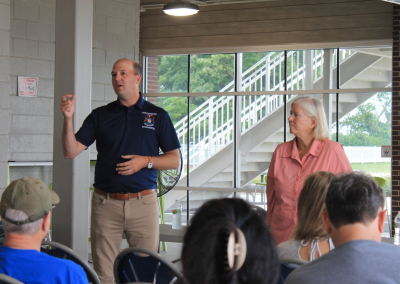Funding for SEMCOG’s Drinking Water Monitoring Program will ensure local communities are equipped with the knowledge necessary to protect public health
MACOMB COUNTY, Mich. (August 6, 2024) — On July 24, Gov. Gretchen Whitmer signed the Fiscal Year (FY) 2025 State Budget into law, which includes $1.5 million for the Southeast Michigan Council of Governments’ (SEMCOG) water monitoring program. Sen. Kevin Hertel (D-St. Clair Shores) and Macomb County Public Works Commissioner Candice Miller celebrate and look forward to the significant benefits this investment will bring to the region, including the more than four million people who rely on the lake as a source of clean drinking water.
“Access to clean drinking water is not just a priority, it’s a necessity,” said Sen. Hertel. “Families across our lakeshore district deserve to know the water coming out of their faucets at home is clean and safe to drink. By investing in SEMCOG’s water monitoring program, we can swiftly detect and address potential contaminants in our water, helping ensure the public health of our region remains strong.”
Along the 80-mile international corridor that spans from Lake Huron to Lake Erie is a heavy manufacturing presence and a concentrated network of petrochemical plants whose accidental spills, along with emergency diversions from community water systems and nutrient-triggered algal blooms, pose a threat to the safety of Southeast Michigan’s water supply. To ensure the 14 water treatment plants that exist along the American-side of the corridor are aware of potential source water risks and can properly respond in a timely manner, SEMCOG established the Drinking Water Protection Network in the mid-2000s. The network includes the Senate District 12 communities of Algonac, Ira Township, New Baltimore, Mount Clemens, and Grosse Pointe Farms, as well as Port Huron, Marysville, St. Clair, East China Township, Marine City, Detroit, Wyandotte, and Monroe. As a participating member of the network, each municipality agrees to monitor in real-time the quality of the source water entering their water treatment plants.
“These funds will re-establish a water quality monitoring system that is critical to the fresh water drinking supply of millions of people,” said Commissioner Miller. “It is a very worthwhile investment of state funds.”
The network is composed of many elements, including a variety of monitors, data logging, and website access. Despite the important role the program serves in the region, they face a number of challenges including dwindling budgets, as well as high costs to maintain and upgrade equipment. The $1.5 million secured in the FY 2025 State Budget will go towards enhancing SEMCOG’s monitoring efforts at the 14 community water intakes along the corridor, helping them protect public health from the harmful impact of potential spills and discharges.
“The value of monitoring, rapid response, and communication in the event of a major spill or discharge cannot be overstated,” said Amy O’Leary, Executive Director of SEMCOG. “About half of Michigan’s population relies on drinking water from the Huron-to-Erie Corridor, and we are extremely pleased to work with Southeast Michigan’s water providers to continue this critical public health protection.”
This funding also builds on a series of investments Sen. Hertel has worked to secure for water infrastructure projects in Macomb County. Throughout his time in the Legislature, he has worked with local officials such as Commissioner Miller, to bring over $95 million back to region to protect the health of Lake St. Clair, including:
-
$72 million for Chapaton Retention Basin in St. Clair Shores to construct additional system storage that can be utilized during heavy rains, helping to reduce combined sewer overflows into Lake St. Clair by 40%. (FY 23)
-
$5 million for the Saint Clair Shores Martin Drain District to address combined sewer overflows and prevent millions of gallons of wastewater from flowing into Lake St. Clair. (FY 24)
-
$5 million for the Chesterfield Interceptor to proactively address aging infrastructure in order to avoid catastrophes like sinkholes. (FY 24)
-
$2 million for New Baltimore to repair the breakwalls at Walter and Mary Burke Park, helping protect the shoreline, prevent flooding, and deter shore erosion. (FY 25)
-
$1.5 million for Mount Clemens to make much-needed updates to their aging sewage treatment infrastructure. (FY 25)
Sen. Kevin Hertel is joined by Macomb County Public Works Commissioner Candice Miller and St. Clair Shores Mayor Kip Walby for a conversation by the lake on July 29, 2024, where the bipartisan trio discussed their efforts to improve local water infrastructure and protect Lake St. Clair. Photo credit: Megan Dombrowski, Michigan Senate Democrats
###


